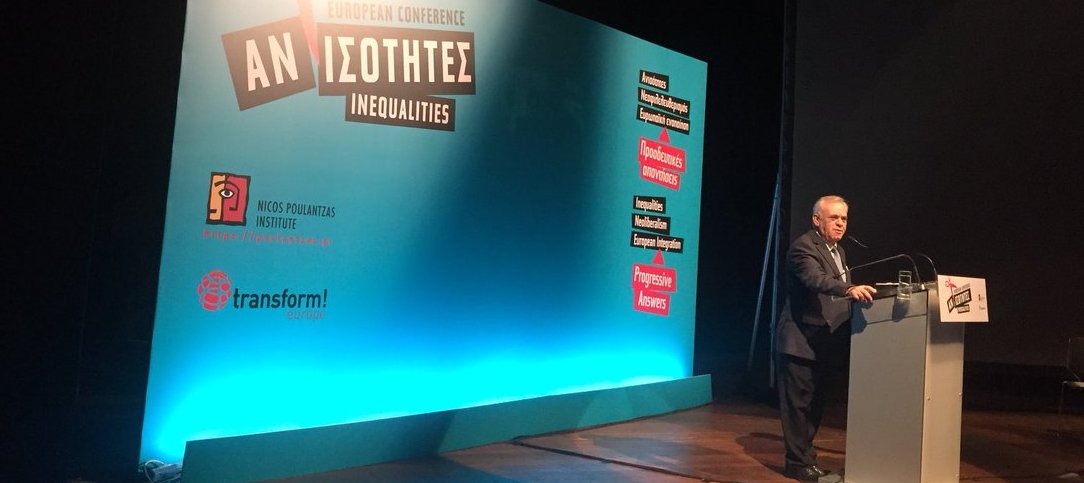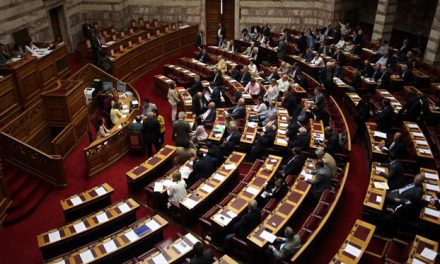The European conference on “Inequalities, Neoliberalism and European Integration: progressive responses”, organized by the Nicos Poulantzas Institute and transform! europe, took place in Athens (23 – 25.11.2017), bringing together intellectuals from many academic disciplines as well as progressive politicians from all over Europe.
In his Keynote speech “For a European Alliance against inequality” (23.11.2017)* Deputy Prime Minister of Greece Yannis Dragasakis focused on the issue of how to fight inequality from the position of a left-wing governmental responsibility. These are the main points he covered in his speech:
“… The Conference is taking place at a juncture when the end of memoranda and period of harsh supervision for Greece are already visible. Accordingly, the first stage of our country’s governance by a left-wing government is being completed. At the same time, the planning of the second and most demanding phase begins: whilst our attention has thus far been focused on coping with the extreme symptoms of poverty and inequality, we now have to plan our ways of addressing the causes with integrated and coherent policies.
Explosion of Inequalities
Capitalism is a system that inherently produces and widens inequalities. However, there have been periods in history when policies – promoted mainly by progressive governments, with the support of strong social movements – succeeded in reducing inequalities. However, since the late 1970s, there has been a clear trend of widening inequalities across a broad spectrum encompassing all aspects of economic and social life.
It is interesting that the issue of inequalities is now acknowledged widely. The IMF recently, through its General Director, highlighted the impact of technological developments on inequality and called for “safety nets” to protect today’s weakest parties.
Similarly, the OECD corroborates that gradual economic recovery does not appear to go hand in hand with any trend reversal of the rising income inequality observed for decades.
Finally, as far as the International Labour Organization is concerned, inequality threatens other social welfare factors such as democracy, public security, social stability, economic and environmental sustainability.
Despite the broad recognition of the problem, if the main factors aggravating inequality – namely the dominance of neoliberalism and the crisis of the subject – are not removed, then the new technological wave is in danger of being accompanied by an even more dramatic widening of social and spatial inequalities, and this, despite the fact that the technologies themselves could facilitate a fair and decentralized development.
The Left in Government: the example of Greece
Almost three years since assuming responsibility to run the country, I personally believe that, a conclusion we can draw, is that even under the most unfavourable political circumstances, even under the harshest budgetary constraints, we were able to put a stop to and reverse the downfall in the critical areas of Health and Education, to reduce unemployment, to set up institutions such as the Social Solidarity Income and universal access of uninsured citizens to the health system, objectives for which we have been struggling for years.
The government has already proceed to actions and policies:
- for the access of all citizens to social benefits (Water and Electricity Supply concession rates, public transport access for the unemployed, free Wi-Fi for first-year students)
- against health inequalities (New Primary Health System / Local Health Units)
- against inequalities in the labour market (strengthening of control mechanisms and of sanctions for combating undeclared and unpaid work)
- to reduce discrimination and inequalities in basic civil rights (extension of civil partnership to gay couples, legal recognition of gender identity, setting limits to the jurisdiction of Islamic Sharia law in the region of Western Thrace, combating violence against women)
- to support vulnerable groups (National Action Plan on Children’s Rights, institutional measures for the Disabled, National Roma Strategy)
- against inequalities in schools (school meals, reinstatement of learning support, etc.)
- supporting Social and Solidarity Economy institutions who put the issue of “equal pay for work of equal value” at the centre of their work
- against regional manifestations of inequality (comprehensive policy for islands, regional development conferences)
Towards a European project based on equality and justice
In any case, addressing inequalities within a country is a multifactorial project taking into account several criteria. The capabilities of a national government are several but finite; depending on the position of a country in the division of labour, the actual scope of intervention is shaped. I think it is obvious that inequalities can be effectively addressed only to a certain extent within the boundaries of the nation state. Recent years have shown that wider alliances and progressive governments in as many countries as possible are required for a radical change in relationships to promote more global solutions to the problem. In my view, the issue of inequality could establish a wider, left-progressive plan on a European scale; it could be the key for achieving left power, the basis for social alliances and political co-operation of the Left. The general recognition of the problem compels us towards a dynamic intervention. I think that this conference will be the springboard for an integrated policy and a wider debate.”
Read more via Greek News Agenda: European Conference | Inequalities, Neoliberalism and European Integration: Progressive Answers















